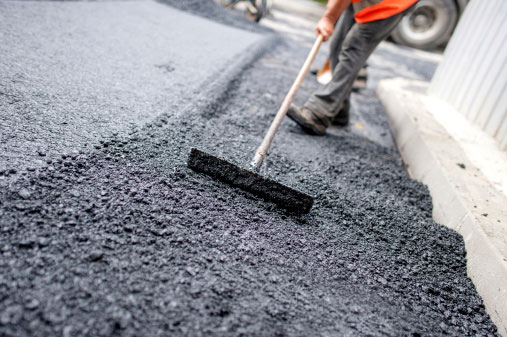Renew Angle Parking Lots: Asphalt Sealing Techniques Revealed
Renew Angle Parking Lots: Asphalt Sealing Techniques Revealed
Blog Article
Cold Mix Asphalt Vs. Hot Mix Asphalt: Which Is Right for You?

Structure Distinctions
Cold mix and warm mix asphalts differ significantly in their structure, with distinctive features that influence their performance and applications. Cold mix asphalt is created by emulsifying the asphalt binder with water and an emulsifying representative prior to mixing it with aggregate. This approach enables the asphalt to be convenient at lower temperatures, making it suitable for short-term fixings and for use in cooler weather. Hot mix asphalt, on the various other hand, is made at high temperatures, usually between 300-350 ° F, which helps to achieve much better compaction and a much more resilient end product. The hot mix asphalt manufacturing procedure involves warming the aggregate and asphalt binder independently prior to integrating them at the asphalt plant.
In addition, cool mix asphalt often tends to be less dense and extra versatile than warm mix asphalt. This flexibility makes it much better fit for areas with higher degrees of activity, such as driveways or roadways with hefty traffic. On the other hand, hot mix asphalt is understood for its high sturdiness and resistance to rutting and fracturing, making it a preferred selection for freeways and high-traffic roadways where longevity is essential.
Installment Process Variations
The process of installing chilly mix and warm mix asphalt shows remarkable differences in their demands and treatments. In comparison, warm mix asphalt necessitates an extra intricate setup process. Due to the heating needs, hot mix asphalt installments are generally carried out by professionals with specialized tools, guaranteeing a more structurally audio and irreversible outcome.
Durability and Longevity Elements
When thinking about asphalt options, durability and durability are critical variables to assess for long lasting pavement efficiency. Warm mix asphalt (HMA) is understood for its extraordinary sturdiness and longevity.
In terms of longevity, HMA generally outshines CMA because of its premium stamina and resistance properties. HMA pavements have a longer service life, calling for less constant repair work and maintenance, which can translate to set you back financial savings over time. In addition, HMA pavements are more quickly personalized to meet details job demands, even more enhancing their sturdiness.
Cost Factors To Consider
Considering the financial implications is an important facet when examining the option between hot mix asphalt (HMA) and cool mix asphalt (CMA) for pavement projects. While the preliminary cost of warm mix asphalt is commonly more than that of cool mix asphalt, HMA commonly supplies a more cost-efficient solution in the future due to its exceptional toughness and long life. HMA is known for its capacity to stand up to rush hour tons and severe climate condition, decreasing the requirement for frequent repairs and maintenance. On the various other hand, cold mix asphalt is more affordable upfront but may need more frequent patching and resurfacing, resulting in higher maintenance costs over time.
In addition to material prices, it's necessary to consider the costs linked with installment and upkeep when comparing HMA and CMA. Inevitably, the decision in between HMA and CMA need to take into account not simply the first expense yet also the long-term financial effects to establish the most affordable alternative for the details pavement project.
Environmental Effect Contrast
Contrast of the ecological impacts between hot mix asphalt (HMA) and chilly mix asphalt (CMA) reveals distinct differences in sustainability practices. HMA production calls for high temperatures, leading to raised energy usage and greenhouse gas emissions.
Furthermore, the usage of CMA usually entails reusing existing asphalt pavement, advertising resource conservation and decreasing the amount of waste sent out to land fills. This reusing aspect even more improves the sustainability of CMA compared to HMA. In general, when considering the environmental impact, CMA arises as a much more eco sustainable option because of its lower power requirements, lowered emissions, and the potential for recycling existing materials. By deciding for CMA over HMA, roadway construction jobs can contribute favorably to ecological angle parking preservation efforts.
Conclusion
In final thought, the selection in between cold mix asphalt (CMA) and warm mix asphalt (HMA) depends upon various variables such as composition, installation procedure, resilience, long life, price, and ecological influence. asphalt patch repair. While CMA supplies a fast and cost-efficient service for small repair work, HMA guarantees premium longevity and long life for rush hour areas. Take into consideration these variables thoroughly to identify which type of asphalt is the ideal selection for your paving requires

Thinking about the monetary ramifications is an essential facet when assessing the choice between warm mix asphalt (HMA) and cool mix asphalt (CMA) for sidewalk jobs. While the preliminary price of warm mix asphalt is typically higher than that of cool mix asphalt, HMA often provides an extra economical option in the lengthy run due to its superior toughness and long life. angle parking.Comparison of the environmental influences in between warm mix asphalt (HMA) and cool mix asphalt (CMA) exposes unique distinctions in sustainability techniques.In final thought, the selection between cool mix asphalt (CMA) and hot mix asphalt (HMA) depends on various factors such as structure, installment process, longevity, longevity, price, and ecological effect
Report this page